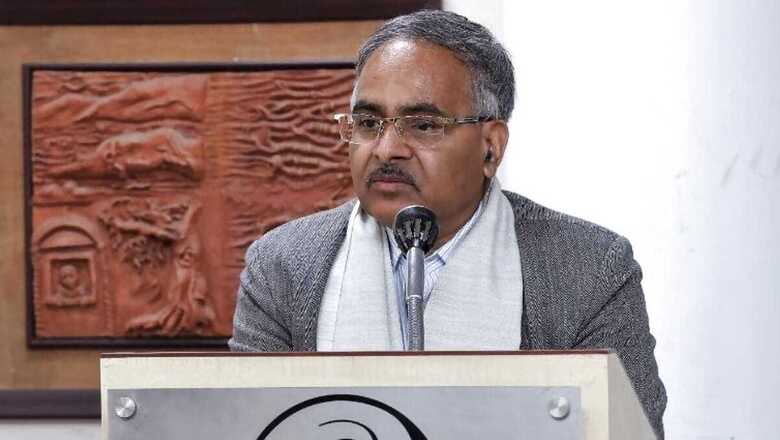
views
From the “controversial” changes introduced in school textbooks to crucial reforms brought in by the BJP-ruled government at the Centre in the education system, Prof Dinesh Prasad Saklani heading the National Council of Educational Research and Training (NCERT) has been the man in the picture throughout the year.
As the year ends, we look at his journey as the NCERT’s director that has made the headlines more often than not.
Teaching history at the Hemvati Nandan Bahuguna Garhwal University, Uttarakhand, Prof Saklani was appointed as the NCERT director last February, the first time that he was heading any academic institution and that too the government’s premier education body. Associated with the department of ancient Indian history, culture and archaeology, Saklani has authored three books, including one titled ‘Ramayana Tradition in Historical Perspective’.
The appointment came at a crucial time when the Ministry of Education (MoE) had tasked the council to develop the new National Curriculum Framework (NCF) as per the provisions of the new National Education Policy (NEP) 2020. The NCF is the most important document brought out by the ministry under this government, based on which, it aims to reform school education from the pre-primary stage to senior secondary, and entails major changes in the way education is imparted in schools.
The NCERT is an autonomous body under the MoE that assists and advises the Central government on framing of policies to improve school education, developing of curriculum and textbooks. NCERT textbooks are taught across the Central Board of Secondary Education (CBSE)-affiliated schools and have been adopted by several state education boards as well.
With Saklani as the chief steering changes in social science textbooks for Classes VI-XII under a “syllabus rationalisation” exercise, the Council ran into controversy again this summer, much the same as last year when the project had begun.
Some of those working closely with him said even though Saklani is quite “vocal” of his opinions, the changes have all been brought about at the ministerial level. There has been a strict directive from the top to not give any interview or comment to the press. Following the controversies, he did appear on TV channels yet refrained from speaking anything beyond the statement that the body had issued in response from time to time.
When News18 reached out to Prof Saklani for a comment on the year-ender, he said he was not available until next week.
Under the rationalisation exercise leading to textbooks being reprinted in 2022-23, the NCERT silently deleted portions from the reprinted Class XI and XII political science, history and sociology textbooks that had references to Mahatma Gandhi, the RSS, Gandhi’s assassin Nathuram Godse and those in more recent political history including the Emergency (1975-77) period and the communal violence that took place in the 2002 Gujarat riots. The deletions, however, were not listed under the “rationalised content” page on the Council’s website.
The deletions became the major topic of discussion during prime time television debates that ran for days altogether, besides drawing widespread criticism from academics, scholars, authors and the Opposition, that made allegations of “saffronising” school education under the garb of rationalisation. When asked, Saklani cited the deletions as a “case of possible oversight”. Another set of deletions that were observed a few months later involved references to Islamic rulers, including the Delhi Sultanate and Mughal empires, which have acquired political undertones under the present-day ruling establishment.
Being questioned on the rationalisation exercise itself, the Council announced that this was being done to streamline chapters that are overlapping with others in the same class and to reduce the overall burden on students since classroom education was disrupted majorly by the Covid-19 pandemic.
Calling the deletions “mutilating” and “embarrassing”, the chief advisors of the original textbooks (2005-07) — Yogendra Yadav and Suhas Palshikar — wrote to the Council asking it to disassociate their names from the textbooks. They were joined by 33 more authors, who too terming the changes “unacceptable”, said they do not wish to remain associated with the textbooks. Even the reprinted version of textbooks bears the names of the authors and advisors who contributed in developing content.
Not backing down to the criticism, the Council put out a statement on its official website maintaining that it will not remove the names of the previous authors, as the NCERT retains the copyrights to all its textbooks.
One of the most recent controversies that took place this October was when a high-level panel for social sciences constituted by the Council recommended that the country’s name ‘India’ be replaced with ‘Bharat’ in the school textbooks for all classes. The panel’s suggestion came soon after the G20 summit that was held this September in the Capital when Prime Minister Narendra Modi’s nameplate bore his name as PM of ‘Bharat’ instead of India.
This time again, when the move drew criticism across the spectrum, the NCERT not fighting in the face rather took to social media platform X (formerly Twitter) from its official handle to tone down the buzz around the name change of the country.
Clarifying its stance, the Council said it was “too premature” to comment on the issue since the development of new syllabi and textbooks were still in process.




















Comments
0 comment